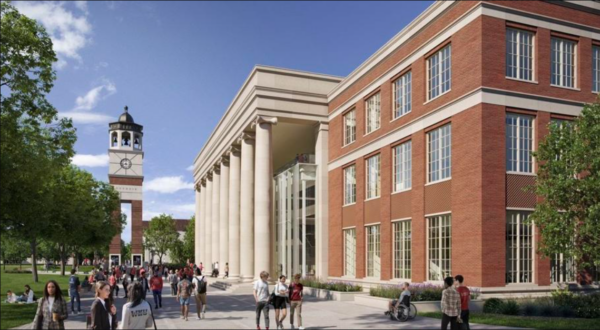The renderings for the prospective business building at Western Kentucky University have been unveiled, and they offer both a tribute to the past and a glimpse into the future.
The images were displayed at Friday’s board of regents meeting, two years after the Gordon Ford College of Business was allocated $74.4 million in the Kentucky General Assembly’s budget for the 2022-24 biennium.
“This has been a university priority for 20 years before I became president six years ago, and I’m thrilled and grateful to the state legislature and governor for making this a reality for our campus,” said WKU President Timothy Caboni.
The Kentucky General Assembly budgeted $74.4 million for Gordon Ford College of Business in 2022-24.
The entrance columns and copper dome with a skylight are examples of the three-story building’s incorporation of collegiate Georgian design principles. Students are expected to ascend the three floors sequentially during their undergraduate careers.

“We discuss the ascent at WKU, your progression from the base of the Hill to the summit, and what this means over the course of four years. “There is also a progression in this facility,” said Caboni.
The building will include a student success center, a trading lab with a New York Stock Exchange ticker and access to Bloomberg Terminals, a coffee shop, 21 classrooms, and a 300-seat auditorium.
This year’s cohort will be the first to attend the majority of their business classes in the new business building, according to Chris Shook, dean of the GFCB. “Their eyes light up.”
The facility will be adjacent to the Guthrie Bell Tower, a campus landmark, and its primary entrance will face the South Lawn.
The project is scheduled to break ground on June 14 and be completed in the summer of 2025, with full operations commencing that autumn. The building does not yet bear a name, which would require a donation of $7.5 million, but discussions are ongoing.

Grise Hall, the current headquarters of the GFCB, was constructed in 1966. Caboni stated that Grise has been of tremendous utility to the GFCB throughout its lifetime and will serve one more function before being demolished.
“In the future, Cherry Hall will undergo a renovation and transformation. “We need a place for everyone currently in Cherry Hall to relocate while we perform these repairs,” said Caboni.
These renovations are scheduled to take place between 2025 and 2027, after which Grise will be demolished after housing relocated students and faculty.
“When Cherry Hall is reoccupied in 2027, we will celebrate the end of Grise’s useful life and demolish it,” said Caboni. He had no information regarding the space’s potential future use.
Chicago-based architecture design firm Gensler was selected to create the building’s aesthetic. Gensler has previously collaborated with WKU on the Commons at Helm Library.
Caboni joked that Shook wanted the building to resemble an Apple Store, to which the president responded, “that’s fine, so long as you wrap it in collegiate Georgian architecture, and Gensler somehow figured out how to do that.”
The new business building was not the only campus facility discussed at Friday’s meeting of the regents.
Several campus structures may receive facelifts in the future years after the board approved the submission of multiple capital projects.
The budget of the Kentucky General Assembly includes $683,500,000 in postsecondary education asset preservation pool bond funds. WKU’s total biennium allocation is slightly more than $68 million, and the university must match 15% of each project’s funds.
The 1927-built Gordon Wilson Hall will undergo up to $2 million in renovations. These would include enhancing conformance with the Americans with Disabilities Act, modernizing facilities, and adding an elevator “if feasible.”
In addition, WKU could receive up to $7 million to restore and replace the roof of E. A. Diddle Arena, which experienced significant deterioration over the winter.
The 24/7 computer center in Jody Richard Hall was allocated $2 million to modernize the space. Up to $2 million and $1 million, respectively, could be allocated to the Kentucky Museum and the Center for Research and Development.
The board also authorized Western Kentucky University’s six-year capital plan, which authorizes the university to undertake significant capital projects if funding becomes available.
Renovations to the Academic Complex, Potter College of Arts and Letters facilities, Cherry Hall, the Innovation Campus, and the Raymond Cravens Library comprise WKU’s five priorities for the period 2024 to 2026.
Also approved was the suspension of the master of arts in folk studies program at WKU, which ceased enrolling new students last autumn. In 2022, the program commemorated its 50th anniversary.
Dean of the Potter College of Arts and Letters Terrance Brown stated that the Department of Folk Studies and Anthropology had requested the replacement of two positions. The institution was able to offer the Kentucky Folklife Program one staff position.
“The faculty weighed those options carefully and determined that they would not meet their needs, so they opted for suspension,” Brown explained.

